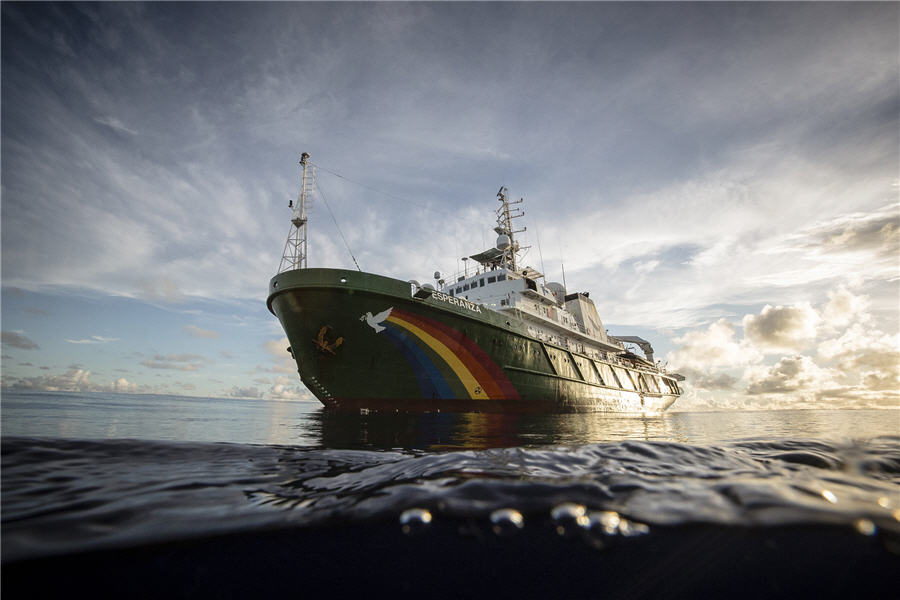Greenpeace ship sets sail to highlight risk of mining below the waves

A Greenpeace ship sets sail on Thursday to study an ecosystem beneath the Atlantic Ocean thought to hold clues to the origins of life to press its case for a ban on deep sea mining, as talks in Jamaica seek to agree rules on deep sea mineral exploitation.
Throughout July, work is under way at the U.N.’s International Seabed Authority (ISA) in Kingston to establish regulation on mining the oceans. So far, regulations have only allowed exploration.
Greenpeace is among the campaigners urging a moratorium at least until the ocean depths are understood.
The group also says the ISA is not the right authority to make the decision. It wants what it calls a global ocean treaty with a holistic view of all the challenges, including fishing and oil drilling, as well as seabed mining.
The ISA had no immediate comment, but has previously said a deep sea mining code could be adopted by July 2020
Gretchen Frueh-Green, a professor at ETH university in Zurich, is on board the Esperanza, which will collect samples from the ecosystem known as the “Lost City”, which she discovered.
A series of ghostly hydrothermal vents thought to harbour clues to the origin of life, it lies in international waters that the ISA governs.
The point, Frueh-Green says, is that science should be allowed to explore first. Exploitation can wait.
“It’s our history, it’s the Earth’s history, and if we perturb it we don’t know how fast it will recover, or what influence the perturbation would have on ocean chemistry,” she said.
The Esperanza, which will take around five days to reach the Lost City once it leaves the Azores on Thursday, is sailing there as part of Greenpeace’s 2019-20 Protect the Oceans campaign.
The group on Wednesday published a report in which it says the ISA “exemplifies the disjointed, pro-exploitation governance status quo that is failing to provide adequate ocean protection”.
It says deep sea mining could cause irreparable damage, including releasing carbon stored in deep sediments that would aggravate global warming.
The ISA had no immediate comment, but has previously said a deep sea mining code could be adopted by July 2020.
Discussions on royalty distribution are likely to complicate this month’s talks.
Among those attending will be Canadian company DeepGreen, in which miner-trader Glencore has a less than 2% stake.
DeepGreen is backed by the governments of Pacific islands Nauru and Kiribati, which would receive royalty payments.
CEO Gerard Barron says his project would only collect nodules from the ocean floor, rather than risk more disruptive seabed mining.
He also says the nickel, cobalt, copper and manganese he seeks are needed for a greener economy and his version of mining is less damaging than some land exploitation.
“This is about planetary survival. It would be irresponsible to freeze work on a new source of metals that could be, on balance, much better for the planet,” he said.
(By Barbara Lewis; Editing by Mark Potter)
{{ commodity.name }}
{{ post.title }}
{{ post.date }}




Comments
Sian Owen
Several of the industry claims in this article are patently false.
In response to “CEO Gerard Barron says his project would only collect nodules from the ocean floor, rather than risk more disruptive seabed mining.” – To collect commercially viable quantities of the metals DeepGreen is targeting, a single 30-year mining operation would churn up an estimated 9,000-10,000 km2 of seabed – an area the size of Lebanon. Sediment plumes generated by the activity would fill the surrounding waters and be carried away by deep currents, reaching ecosystems far beyond the mining site. The noise and light of the subsea machinery could cause harm to marine organisms adapted to the quiet darkness, while large quantities of wastewater with residual ore and sediment would be discharged back into the sea.
In response to “He also says the nickel, cobalt, copper and manganese he seeks are needed for a greener economy and his version of mining is less damaging than some land exploitation.” – The projections of future mineral demand vary greatly depending on background assumptions, including what a revolutionary approach to investing in an truly innovative transition economy might deliver in terms of redesign, reduction, reuse and recycling. Further, there is no evidence that, if permitted, deep seabed mining would replace terrestrial mining.
“This is about planetary survival. It would be irresponsible to freeze work on a new source of metals that could be, on balance, much better for the planet,” he said. – As noted in the May 2019 UN IPBES report, what is truly irresponsible and counter to planetary survival is the continued pursuit of an industrial extraction based economy.